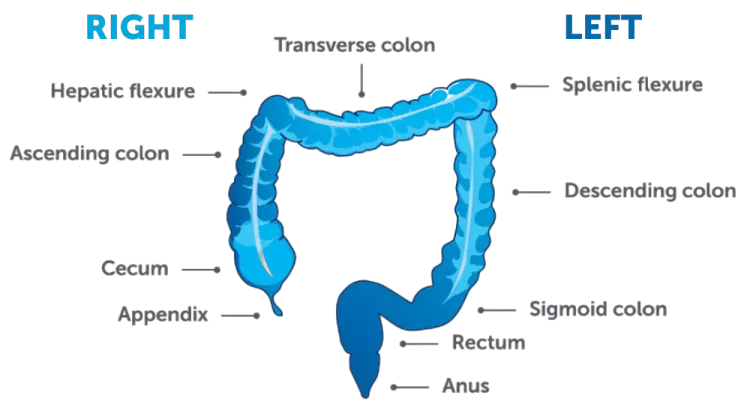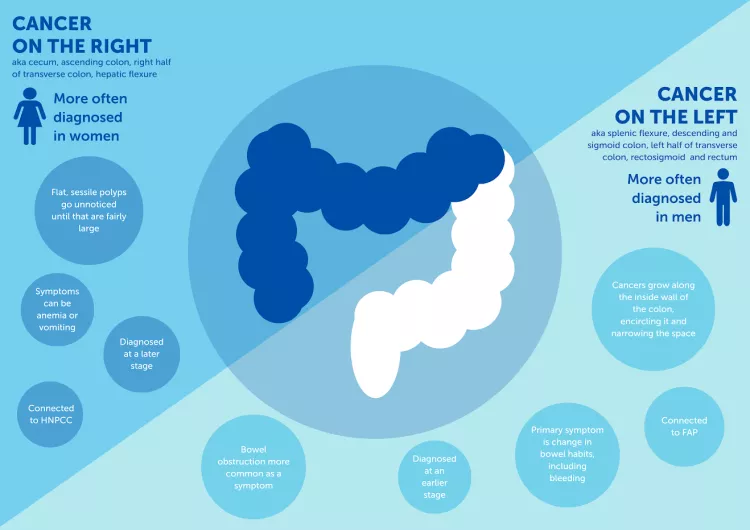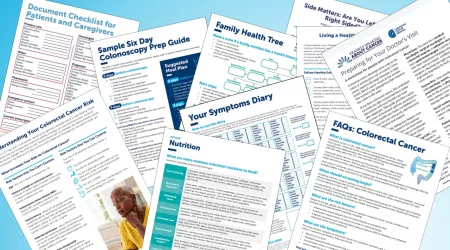Sidedness: right-side vs. left-side colorectal cancer
Knowing where your tumor is located and which biomarkers you have can help you and your doctor choose the most effective treatment for your specific colorectal cancer.
Side makes a difference: left vs. right
Understanding the physical structure of the colon and rectum can help you better understand your cancer diagnosis.
The colon and rectum are part of the large intestine (also called the small bowel), which is located at the end of the digestive system. The large intestine is a six-foot-long muscular tube that helps digest food and eliminate waste from the body.
The two sides
The right side of the colon includes the:
- cecum
- ascending colon
- hepatic flexure
The left side includes the:
- splenic flexure
- descending colon
- sigmoid colon
- rectum
The colon is divided into four sections
- The first section is the ascending colon. It extends from the small intestine to a pouch called the cecum. The ascending colon travels up the right side of the abdomen.
- The transverse colon is the second section, and it continues across the abdomen from the right side to the left side.
- The third section is the descending colon, which extends down the left side of the abdomen.
- The fourth section is the sigmoid colon. It is the last portion of the colon, and it connects to the rectum and anus.

Significance of tumor location
Research suggests that there are biological differences between left-sided and right-sided colon cancers. This includes the biomarkers that are present on each side and the aggressiveness of the cancer. Patients with left-sided tumors typically have a better prognosis than those with right-sided tumors.
Make sure you know your biomarkers and where your tumor is located so that you and your doctor can choose the best treatment.
Right-side colorectal cancer characteristics
Colorectal cancer that starts on the right side (Cecum, Ascending Colon, Right Half of Transverse Colon, Hepatic Flexure)
- is seen more often in women and people over 65
- is diagnosed more frequently in African Americans
- often begins with flat, sessile polyps that go unnoticed until they are fairly large
- is usually diagnosed at a later stage
- often presents with symptoms such as anemia and bleeding
- is associated with Lynch syndrome
- has a higher occurrence of mucinous tumors, BRAF-mt or KRAS-mt mutations, MSI-H
- responds well to immunotherapy
Left-side colorectal cancer characteristics
Colorectal cancer that begins on the left side (Splenic Flexure, Descending and Sigmoid Colon, Left Half of Transverse Colon, Rectosigmoid and Rectum)
- occurs more often than right-sided colorectal cancers
- is seen more often in men and in people under 65
- has tumors that grow along the wall of the colon
- often presents with constipation, narrow stools, and other bowel habit changes
- causes bowel obstructions more often than right-sided colorectal cancer
- is usually diagnosed in its early stages
- is associated with FAP (familial adenomatous polyposis)
- has a higher occurrence of HER2 amplifications
- overall better prognosis than right-sided tumors
- responds better to standard chemotherapy and targeted therapies

Want to know more?
This content was developed with support from

Top resources

Colorectal cancer resources for learning and sharing
Whether personally impacted by colorectal cancer (CRC), supporting a loved one, or dedicated to educating and empowering others, these downloadable and printable resources can help.

Don Shippey: from stage IV to six years cancer-free after receiving HAI pump
Don Shippey was 55 years old in 2016 when he decided he’d been putting off his colonoscopy long enough.

Gabriel Leblanc: How the Alliance changed my life
It’s scary to hear the “c” word, especially when you’re only 36. A million questions ran through Gabriel Leblanc’s mind, but only one seemed to matter. “How was I going to get through this?” Gabriel said.





